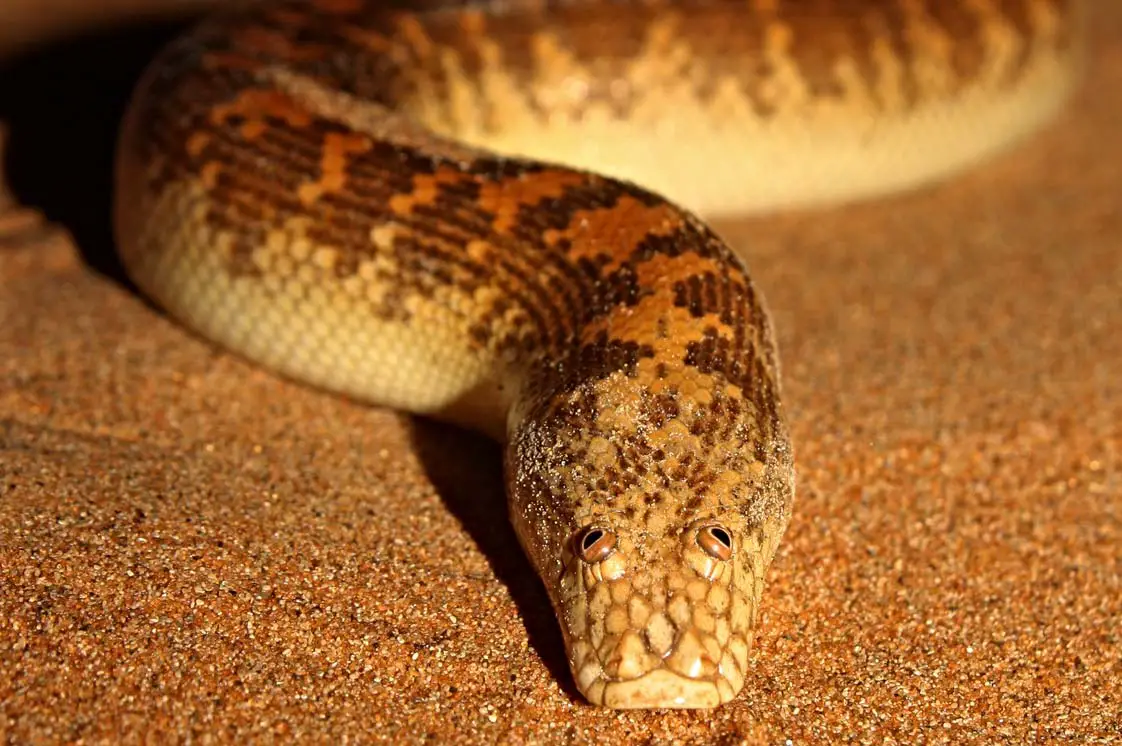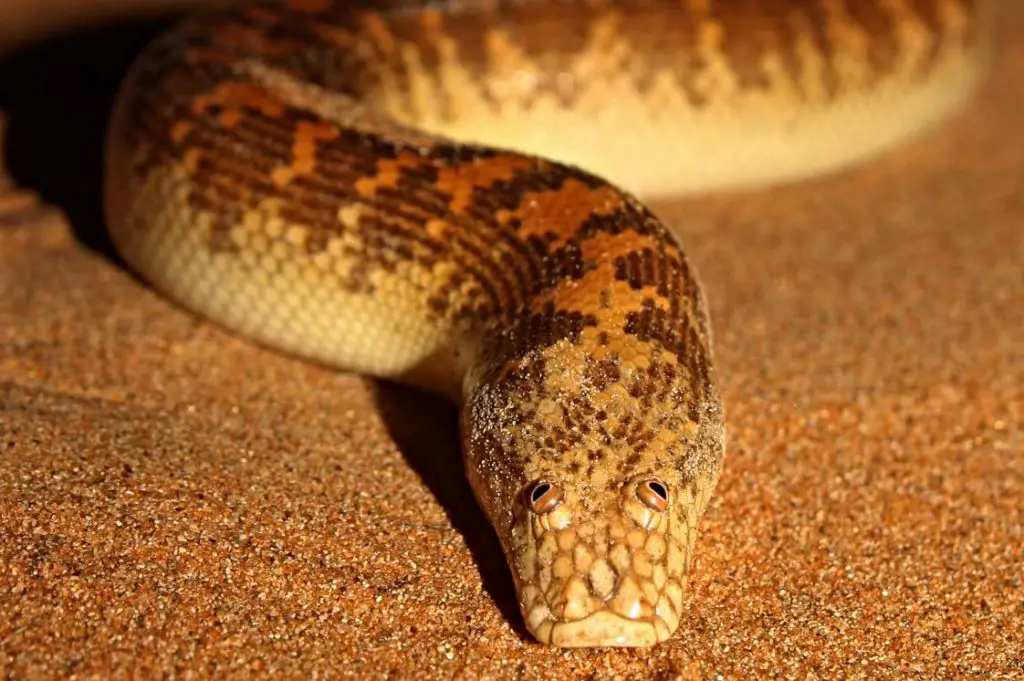If you’re a snake enthusiast, you might have heard of the Arabian Sand Boa, a small and elusive snake that lives in the deserts of the Middle East. While these snakes may not be as well-known as some of their more famous cousins, they still have plenty of fans who are curious about their habits and behaviors. One question that often comes up is whether or not Arabian Sand Boas are poisonous – and the answer might surprise you!
Despite their intimidating appearance, Arabian Sand Boas are actually not venomous. This means that if you come across one in the wild (which is unlikely, as they are notoriously difficult to spot), you don’t need to worry about being bitten and poisoned. However, there are still plenty of fascinating things to learn about these unique creatures, from their hunting habits to their preferred habitats. So if you’re interested in learning more about the Arabian Sand Boa, read on!
Arabian Sand Boas are non-venomous and harmless to humans. Although they have small teeth, they are not dangerous and are not known to be aggressive. These small, docile snakes make great pets for beginner snake owners as they are easy to care for and require minimal space.

Are Arabian Sand Boas Poisonous? The Truth About These Unique Snakes
Introduction: What is an Arabian Sand Boa?
Arabian Sand Boas, also known as Eryx jayakari, are a species of snake that inhabit the deserts of the Arabian Peninsula, including Oman, Yemen, and the United Arab Emirates. As their name suggests, these snakes spend most of their time buried beneath the sand, where they hunt for small rodents and other prey.
Physical Characteristics of Arabian Sand Boas
Arabian Sand Boas are relatively small snakes, typically reaching lengths of around 2 feet. They have a distinctive appearance, with a wide, triangular head, a stout body, and smooth, shiny scales that range in color from reddish-brown to pale yellow. Their eyes are small and beady, and they have a row of sharp teeth that they use to grab onto their prey.
Despite their somewhat intimidating appearance, Arabian Sand Boas are surprisingly docile and make great pets for snake enthusiasts. They are also relatively easy to care for, requiring a dry, sandy substrate and a consistent heat source to maintain their body temperature.
Are Arabian Sand Boas Poisonous?
One of the most common questions that people ask about Arabian Sand Boas is whether or not they are poisonous. The answer, thankfully, is no. Arabian Sand Boas are not venomous and pose no threat to humans or other animals.
That being said, Arabian Sand Boas do have some unique adaptations that help them to subdue their prey. Like all members of the Boidae family, Arabian Sand Boas are constrictors, meaning that they use their muscular bodies to wrap around their prey and squeeze them until they suffocate. However, unlike many other constrictor species, Arabian Sand Boas also have a pair of small, hooked teeth in the back of their mouths that they use to hold onto their prey while they constrict.
Benefits of Owning an Arabian Sand Boa
If you’re thinking about getting a pet snake, an Arabian Sand Boa might be a great choice for you. These snakes are relatively easy to care for and can make fascinating and engaging pets. They are also quite docile and rarely bite, making them a good choice for first-time snake owners.
In addition, Arabian Sand Boas have some unique adaptations that make them particularly interesting to observe. For example, their wide, triangular heads are perfectly adapted for burrowing through the sand, and their smooth, shiny scales help to reduce friction as they move. They are also quite active and curious, making them fun to watch as they explore their surroundings.
How to Care for an Arabian Sand Boa
If you do decide to get an Arabian Sand Boa as a pet, it’s important to make sure that you are able to provide them with the care and attention that they need. Here are some tips for caring for your new pet:
- Provide a dry, sandy substrate for your snake to burrow in.
- Make sure that your snake has a consistent heat source to maintain their body temperature.
- Feed your snake a diet of small rodents, such as mice or rats.
- Handle your snake gently and with care, as they are delicate creatures.
- Monitor your snake’s health closely, and take them to a veterinarian if you notice any signs of illness or distress.
Arabian Sand Boas vs. Other Snake Species
While Arabian Sand Boas are certainly unique and fascinating creatures in their own right, they are just one of many different species of snakes that you might encounter. Here are some of the key differences between Arabian Sand Boas and other snake species:
| Species | Size | Appearance | Venomous? |
|---|---|---|---|
| Arabian Sand Boa | Up to 2 feet | Wide, triangular head; smooth, shiny scales | No |
| Rattlesnake | Up to 8 feet | Rattle on tail; diamond-shaped head | Yes |
| Python | Up to 30 feet | Long, slender body; small, triangular head | No |
Conclusion
In conclusion, Arabian Sand Boas are fascinating and unique creatures that are well-suited for life in the desert. While they are not poisonous, they do have some unique adaptations that help them to subdue their prey. If you’re thinking about getting an Arabian Sand Boa as a pet, be sure to provide them with the care and attention that they need to thrive.
Frequently Asked Questions
Here are some of the most commonly asked questions about Arabian Sand Boas and their toxicity.
Are Arabian Sand Boas Poisonous?
Arabian Sand Boas are not considered to be venomous or poisonous. This means that they do not produce any toxic substances that could harm humans or other animals. However, it is important to note that Arabian Sand Boas are still capable of biting and could potentially transmit bacteria or other harmful microorganisms through their saliva.
If you are bitten by an Arabian Sand Boa, it is important to clean and disinfect the wound as soon as possible to reduce the risk of infection. Additionally, if you experience any symptoms such as swelling, pain, or redness around the bite area, it is recommended that you seek medical attention immediately.
What should I do if I am bitten by an Arabian Sand Boa?
If you are bitten by an Arabian Sand Boa, it is important to remain calm and seek medical attention immediately. While Arabian Sand Boas are not venomous or poisonous, their bites can still cause pain and potentially transmit harmful bacteria or microorganisms.
Before seeking medical attention, it is recommended that you clean and disinfect the bite wound as thoroughly as possible to reduce the risk of infection. You should also try to keep the affected area elevated and apply a cold compress to reduce swelling and pain.
What are the symptoms of an Arabian Sand Boa bite?
The symptoms of an Arabian Sand Boa bite can vary depending on the individual and the severity of the bite. Some common symptoms include pain, swelling, redness, and tenderness around the bite area. In more severe cases, the bite may also cause fever, chills, and other flu-like symptoms.
If you experience any symptoms after being bitten by an Arabian Sand Boa, it is important to seek medical attention immediately to reduce the risk of complications.
How can I avoid being bitten by an Arabian Sand Boa?
The best way to avoid being bitten by an Arabian Sand Boa is to avoid handling them or disturbing them in their natural habitat. If you encounter an Arabian Sand Boa in the wild, it is recommended that you give them plenty of space and avoid making sudden movements or loud noises.
If you keep an Arabian Sand Boa as a pet, it is important to handle them gently and with care to avoid causing them stress or discomfort. You should also ensure that their enclosure is secure and that they have plenty of hiding places to reduce the likelihood of them feeling threatened or aggressive.
Can Arabian Sand Boas be kept as pets?
Yes, Arabian Sand Boas can be kept as pets. They are relatively easy to care for and do not require a large amount of space. However, it is important to note that Arabian Sand Boas are not the most social or interactive pets and may not be the best choice for those looking for a pet that can be handled and played with regularly.
If you do decide to keep an Arabian Sand Boa as a pet, it is important to research their care requirements carefully and ensure that you are able to provide them with a suitable environment and diet. You should also be prepared to handle them with care and respect their natural behaviors and tendencies.
Arabian Sand Boa – Animal of the Week
In conclusion, Arabian Sand Boas are not poisonous. While they may look intimidating with their large size and sharp fangs, they are actually harmless to humans. This makes them great pets for those who are interested in exotic animals but may be wary of venomous snakes.
However, it is important to note that Arabian Sand Boas still require proper care and attention. Owners should ensure that their pet has a suitable enclosure, a balanced diet, and regular veterinary check-ups. It is also crucial to handle them with care, as they can still bite if they feel threatened.
Overall, Arabian Sand Boas are fascinating creatures that can make great pets for the right person. By understanding their unique needs and behaviors, owners can provide them with a happy and healthy life. So if you’re looking for a unique and low-maintenance pet, consider adding an Arabian Sand Boa to your family!

